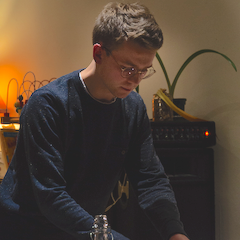The programme for Scottish Opera’s current production of The Trial, a 2014 chamber opera by Philip Glass and librettist Christopher Hampton, announces the relevance of Franz Kafka’s novella, on which the opera is based, for today’s world. Strange feelings of helplessness and guilt in the face of ever-confounding bureaucratic systems is the key theme here. We might have hoped that a contemporary opera, in updating such a famous text, would shed some light on the confusions of the 21st century. Not so. Albert Camus, in his short essay on Kafka, tells us that “The whole art of Kafka consists in forcing the reader to re-read. His endings, or his absence of endings, suggest explanations which […] require that the story be re-read from another point of view.” If we think of Hampton and Glass’s version of The Trial as a re-reading, as we might of any adaption of Kafka’s text, it turns out to be a disappointingly conservative and unfocussed interpretation.
Josef K wakes up on his 30th birthday to discover he is on trial for an unexplained crime. Following his bedroom arrest, K finds himself dragged into a strange sequence of events, encountering a bizarre array of characters in various insalubrious places. Josef K’s experience will probably be strangely familiar to most people because it plays out the Freudian association between superego and id, according to which we live in a perpetual state of guilt administered by an inscrutable faculty of self-judgement which simultaneously encourages and forbids the basest forms of pleasure. Hence, the Law and the injunction to enjoy are closely linked and are equally obscene. Josef K is disgusted and fascinated by the sexual acts he witnesses in almost every dark corner just as much as he is baffled by the unfathomable demands of his criminal charge. In the penultimate scene, K begs the Priest to reveal what the system of Law wants of him and the chilling reply is that it wants nothing at all.
Philip Glass is now a veteran composer of opera. The programme for this production tells us that, despite being one of the “founding fathers of Minimalism”, Glass “avowedly detests the term.” Nevertheless, the spectre of minimalism has never left him: the characteristic arpeggios and the slow tonal/modal harmonic rhythm of his early musical style have persisted. If we posit a definition of ‘classic’ Minimalism, it might be this: the repetition of musical material which is regular, sustained across excessively long durations. The compositional interest of Minimalism lies precisely in how repetitive, regular material might change in a span of time which ‘goes beyond going beyond’ our normal threshold of boredom, and how these changes can function. Minimalism never leads to a conclusion and so it models the structure of desire and perpetual frustration. Minimalism, therefore, appears to be perfectly suited to Kafka’s The Trial.
The music of Glass and Hampton’s opera, however, never sits still: musical sections are like terraced blocks, always changing texture, tempo and instrumentation, and the harmony shifts around to reflect the text. There is no time for repetition to take its toll; it just creates a background atmosphere for each scene. Sometimes a moment will be extended a little beyond naturalism but sadly never ad absurdum. Intriguingly, the most archetypal minimalistic passages accompany sexual or sadistic scenes. Christopher Hampton’s libretto is long and prosaic, and Glass’ word setting mostly follows speech rhythms and cadences, albeit in a subtly estranged and awkward way. But compositionally the opera is as generic and conventional as could be: the music reflects the words; dramatic words deserve dramatic declamations; exciting moments are given faster, louder music; and so on. Take, for instance, the final scene in which K is castrated “like a dog”, accompanied by a sudden crescendo in the orchestra. But this is hardly the shock Glass and Hampton think it is because K was symbolically castrated all along: there would be other, less predictable ways to end the opera. Contrary to critical consensus, Glass’ music is in fact too profligate and not economical enough. As it stands, it’s a bland impression of what contemporary opera supposedly is, and a deeper, more radical approach could have enlivened its flat and obvious correspondence between music and drama. Opera can be so much more intelligent than this.
Despite fundamental shortcomings, the cast gave a strong performance and the tiny orchestra coped well with the aesthetic sheen of Glass’ style. The set design and lighting are effective. The overtly comical touch opted for may not be to everyone’s taste: Kafka’s absurd humour doesn’t exactly need to be ‘performed’. There were influences of Yiddish theatre in the costumes and music which were never properly developed. Modern opera absolutely must be promoted and the courtship of music and drama is still in its early days. Philip Glass and Christopher Hampton, unfortunately, are far from fulfilling its potential.




